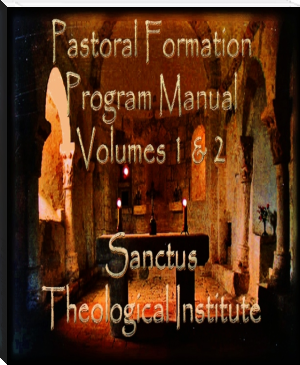The Antichrist - Friedrich Wilhelm Nietzsche (ebook reader ink .TXT) 📗

- Author: Friedrich Wilhelm Nietzsche
- Performer: 1884365205
Book online «The Antichrist - Friedrich Wilhelm Nietzsche (ebook reader ink .TXT) 📗». Author Friedrich Wilhelm Nietzsche
[6] The word Semiotik is in the text, but it is probable that Semantik is what Nietzsche had in mind.
[7] One of the six great systems of Hindu philosophy.
[8] The reputed founder of Taoism.
[9] Nietzsche’s name for one accepting his own philosophy.
[10] That is, the strict letter of the law—the chief target of Jesus’s early preaching.
[11] A reference to the “pure ignorance” (reine Thorheit) of Parsifal.
33.In the whole psychology of the “Gospels” the concepts of guilt and punishment are lacking, and so is that of reward. “Sin,” which means anything that puts a distance between God and man, is abolished—this is precisely the “glad tidings.” Eternal bliss is not merely promised, nor is it bound up with conditions: it is conceived as the only reality—what remains consists merely of signs useful in speaking of it.
The results of such a point of view project themselves into a new way of life, the special evangelical way of life. It is not a “belief” that marks off the Christian; he is distinguished by a different mode of action; he acts differently. He offers no resistance, either by word or in his heart, to those who stand against him. He draws no distinction between strangers and countrymen, Jews and Gentiles (“neighbour,” of course, means fellow-believer, Jew). He is angry with no one, and he despises no one. He neither appeals to the courts of justice nor heeds their mandates (“Swear not at all”).[12] He never under any circumstances divorces his wife, even when he has proofs of her infidelity.—And under all of this is one principle; all of it arises from one instinct.—
[12] Matthew v, 34.
The life of the Saviour was simply a carrying out of this way of life—and so was his death.... He no longer needed any formula or ritual in his relations with God—not even prayer. He had rejected the whole of the Jewish doctrine of repentance and atonement; he knew that it was only by a way of life that one could feel one’s self “divine,” “blessed,” “evangelical,” a “child of God.” Not by “repentance,” not by “prayer and forgiveness” is the way to God: only the Gospel way leads to God—it is itself “God!”—What the Gospels abolished was the Judaism in the concepts of “sin,” “forgiveness of sin,” “faith,” “salvation through faith”—the whole ecclesiastical dogma of the Jews was denied by the “glad tidings.”
The deep instinct which prompts the Christian how to live so that he will feel that he is “in heaven” and is “immortal,” despite many reasons for feeling that he is not “in heaven”: this is the only psychological reality in “salvation.”—A new way of life, not a new faith....
34.If I understand anything at all about this great symbolist, it is this: that he regarded only subjective realities as realities, as “truths”—that he saw everything else, everything natural, temporal, spatial and historical, merely as signs, as materials for parables. The concept of “the Son of God” does not connote a concrete person in history, an isolated and definite individual, but an “eternal” fact, a psychological symbol set free from the concept of time. The same thing is true, and in the highest sense, of the God of this typical symbolist, of the “kingdom of God,” and of the “sonship of God.” Nothing could be more un-Christian than the crude ecclesiastical notions of God as a person, of a “kingdom of God” that is to come, of a “kingdom of heaven” beyond, and of a “son of God” as the second person of the Trinity. All this—if I may be forgiven the phrase—is like thrusting one’s fist into the eye (and what an eye!) of the Gospels: a disrespect for symbols amounting to world-historical cynicism.... But it is nevertheless obvious enough what is meant by the symbols “Father” and “Son”—not, of course, to every one—: the word “Son” expresses entrance into the feeling that there is a general transformation of all things (beatitude), and “Father” expresses that feeling itself—the sensation of eternity and of perfection.—I am ashamed to remind you of what the church has made of this symbolism: has it not set an Amphitryon story[13] at the threshold of the Christian “faith”? And a dogma of “immaculate conception” for good measure?... And thereby it has robbed conception of its immaculateness—
[13] Amphitryon was the son of Alcaeus, King of Tiryns. His wife was Alcmene. During his absence she was visited by Zeus, and bore Heracles.
The “kingdom of heaven” is a state of the heart—not something to come “beyond the world” or “after death.” The whole idea of natural death is absent from the Gospels: death is not a bridge, not a passing; it is absent because it belongs to a quite different, a merely apparent world, useful only as a symbol. The “hour of death” is not a Christian idea—“hours,” time, the physical life and its crises have no existence for the bearer of “glad tidings.”... The “kingdom of God” is not something that men wait for: it had no yesterday and no day after tomorrow, it is not going to come at a “millennium”—it is an experience of the heart, it is everywhere and it is nowhere....
35.This “bearer of glad tidings” died as he lived and taught—not to “save mankind,” but to show mankind how to live. It was a way of life that he bequeathed to man: his demeanour before the judges, before the officers, before his accusers—his demeanour on the cross. He does not resist; he does not defend his rights; he makes no effort to ward off the most extreme penalty—more, he invites it.... And he prays, suffers and loves with those, in those, who do him evil.... Not to defend one’s self, not to show anger, not to lay blames.... On the contrary, to submit even to the Evil One—to love him....
36.—We free spirits—we are the first to have the necessary prerequisite to understanding what nineteen centuries have misunderstood—that instinct and passion for integrity which makes war upon the “holy lie” even more than upon all other lies.... Mankind was unspeakably far from our benevolent and cautious neutrality, from that discipline of the spirit which alone makes possible the solution of such strange and subtle things: what men always sought, with shameless egoism, was their own advantage therein; they created the church out of denial of the Gospels....
Whoever sought for signs of an ironical divinity’s hand in the great drama of existence would find no small indication thereof in the stupendous question-mark that is called Christianity. That mankind should be on its knees before the very antithesis of what was the origin, the meaning and the law of the Gospels—that in the concept of the “church” the very things should be pronounced holy that the “bearer of glad tidings” regards as beneath him and behind him—it would be impossible to surpass this as a grand example of world-historical irony—
37.—Our age is proud of its historical sense: how, then, could it delude itself into believing that the crude fable of the wonder-worker and Saviour constituted the beginnings of Christianity—and that everything spiritual and symbolical in it only came later? Quite to the contrary, the whole history of Christianity—from the death on the cross onward—is the history of a progressively clumsier misunderstanding of an original symbolism. With every extension of Christianity among larger and ruder masses, even less capable of grasping the principles that gave birth to it, the need arose to make it more and more vulgar and barbarous—it absorbed the teachings and rites of all the subterranean cults of the imperium Romanum, and the absurdities engendered by all sorts of sickly reasoning. It was the fate of Christianity that its faith had to become as sickly, as low and as vulgar as the needs were sickly, low and vulgar to which it had to administer. A sickly barbarism finally lifts itself to power as the church—the church, that incarnation of deadly hostility to all honesty, to all loftiness of soul, to all discipline of the spirit, to all spontaneous and kindly humanity.—Christian values—noble values: it is only we, we free spirits, who have re-established this greatest of all antitheses in values!...
38.—I cannot, at this place, avoid a sigh. There are days when I am visited by a feeling blacker than the blackest melancholy—contempt of man. Let me leave no doubt as to what I despise, whom I despise: it is the man of today, the man with whom I am unhappily contemporaneous. The man of today—I am suffocated by his foul breath!... Toward the past, like all who understand, I am full of tolerance, which is to say, generous self-control: with gloomy caution I pass through whole millenniums of this madhouse of a world, call it “Christianity,” “Christian faith” or the “Christian church,” as you will—I take care not to hold mankind responsible for its lunacies. But my feeling changes and breaks out irresistibly the moment I enter modern times, our times. Our age knows better.... What was formerly merely sickly now becomes indecent—it is indecent to be a Christian today. And here my disgust begins.—I





Comments (0)